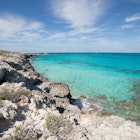
May 27, 2024 тЂ 10 min read

Mexico is the best place to get a good look at the gentle giants of the shark world. Ken Kiefer / Getty Images
If you are a frequent ocean-swimmer, you've likely been accompanied by sharks and didnтt realize it. Why? Because sharks typically want nothing to do with humans. But what if you want a little up-close-and-personal time with these awesome animals?
Editor's note: Please check the latest travel restrictions before planning any trip and always follow government advice.
Sharks are absolutely crucial when it comes to having a healthy ocean environment. Luckily, supporting shark conservation comes in many different forms and you can be a part of it. From shark-tagging with scientists in the Bahamas to swimming with sharks in Hawaii to photographing them in Rhode Island, hereтs where to score quality time with these misunderstood creatures.

The gorgeous waters off Great Exuma are home to tiger sharks, nurse sharks and Caribbean reef sharks galore. Thanks to the Bahamas' distinction as a shark sanctuary, the shark population here is protected and healthy. That said, itтs an ideal place to conduct shark research. Thatтs where , a nonprofit-organization focused on shark conservation, and , come in. Its shark-tagging program gives people the chance to step into the role of shark scientist for the day.
For four hours youтll be gathering scientific data from sharks to help scientists understand the sharkтs movements and how the sharks are using their habitats. Guests, if they choose, help measure the sharks, take small tissue and fin-clip samples and attach tags and tracking devices to sharks. So far, the team has tagged almost 200 sharks in the .
Afterward, relax at Grand Isle with a massage, a dip in the infinity-edge pool or a Bahamian-inspired dinner at . Hotel guests have full access and non-guests may purchase a day pass for $50. If youтre ready to venture out again, the hotel can arrange lunch on a private island or a boat tour through the Exuma Cays for cave snorkeling and a stop at a gorgeous sandbar.
How it works: Reserve spots on shark-tagging adventures by making a to Beneath the Waves.
What else is there to see: Stingrays, sea turtles, and an island of iguanas.
When to go: Keep an eye on the website to find out when the next excursions will be.
Each year, leopard sharks flock to the photogenic coast of La Jolla, a seaside community in San Diego. What makes it so special? Itтs the largest annual aggregation of leopard sharks in the world. Thanks to the calm, shallow water and nutrient-rich kelp forests, itтs an ideal place for hundreds of pregnant female leopard sharks to take up residence; theyтre often just a few feet from shore.
Say hello to the sharks while you flipper-kick through four microhabitats in the La Jolla Underwater Park. An hour-long leopard-shark tour with is perfect for newbie shark enthusiasts since leopard sharks (typically about 4ft long) are . Added bonus: Their distinctive markings make for some epic underwater photos. If youтre lucky, you may spot tiny baby leopard sharks.
Continue the adventure by kayaking to the sea caves or hiking Mount Soledad for epic views of San Diego County. When hunger strikes, pop into for drool-worthy fish tacos, oysters and homemade seafood soups.
How it works: Meet at the Everyday California shop and two snorkel guides will lead you through the rocky reefs in search of leopard sharks.
What else is there to see? Shovel nose guitar fish, dolphins, sea lions, lobsters and turtles.
When to go: July through September
The Bahamas is also home to Tiger Beach, a consistently sharky spot attracting divers from around the world. Known for their beautiful stripes and broad, flat heads, tiger sharks are the star attraction of this dive spot. You canтt miss тem: these mammoths can weigh more than 1,900 pounds. An added bonus: reef sharks, lemon sharks, hammerheads and nurse sharks love to frequent the area, too.
Because visibility is often 100ft or more at Tiger Beach, it makes for not only an unforgettable dive but also an insane backdrop for photos. Believe it or not, many of these creatures travel thousands of miles each year and end up back at Tiger Beach consistently.

, a dive shop located at r, is where the adventure begins. From the hotel, itтs a two-and-a-half-hour boat ride to Tiger Beach. Youтll have two 1-hour long dives in approximately 25ft of water.
How it works: Groups are limited to a maximum of eight divers. Guests staying at Old Bahama Bay receive a diving discount.
What else is there to see: Sea turtles, mahi mahi, tuna, grouper, snapper and barracuda.
When to go: September to April
To score some quality time with the biggest shark in the ocean, the whale shark, visit Cancun. Hundreds of the majestic creatures (some are the length of a school bus) migrate here every year to feed and socialize. You can get close enough to the gentle giants to clearly see the perfectly patterned pale yellow dots and stripes on their skin. Donтt worry, though: Plankton is their snack of choice.
takes guests (up to 10) on a day trip that gives you two glorious hours swimming with the whale sharks. Afterward, enjoy a pitstop in Punta Norte in Isla Mujeres to snack on fresh ceviche.
Rest your head at , an adults-only all-inclusive in Cancun. Treat your muscles to a hot and cold hydromassage bath at the spa, relax in the pool in a floating chair or take a ride on the boat channel system. With one private beach club, seven У la carte restaurants, one show-cooking restaurant and 18 bars, itтs impossible to be bored. Be sure to leave time to see the Mayan ruins and a nearby cenote.
How it works: For the whale-shark tour, Blue Caribe picks guests up at the hotel around 7:30 am and returns them around 4 pm
What else is there to see: Sea turtles, manta rays and starfish.
When to go: June through September
New England is home to about 50 species of sharks. The main ones you will come across, though, are the blue shark and the mako shark. Hitting speeds of up to 60 mph, makos are the fastest shark in the ocean. Both travel the Gulf Stream waters here, and itтs one of only a few locations in the world where they can regularly be encountered.
, run by award-winning shark cinematographer , offers a 12-hour excursion on a 45-foot research vessel custom-made for interacting with and filming wildlife. Throughout the day sharks will arrive at the boat as you drift over different sites.
How it works: Most trips are run in three consecutive days to maximize the animals you see. There are a few days per month, however, for one or two-day trips. Divers must wear all-black wetsuits, fins, gloves, hoods, masks and snorkels.
What else is there to see: Whales, dolphins, mola mola and mahi mahi.
When to go: Mid-June to mid-September
About three miles off of Oahuтs North Shore, itтs possible to find Galapagos sharks, sandbar sharks and tiger sharks. For a chance to spend quality time with them, sign up for a 2-hour pelagic shark snorkel with Ocean Ramseyтs , and you might meet Captain Pancakes, Frankenfin or Miss Aloha. (The team has affectionately named some of the repeat shark visitors.) When it comes to sharks, Ramseyтs goal is to replace fear with education. Guests join marine biologists on the excursion and learn all about shark conservation and research.
How it works: Guests don snorkels and stay near the boat. For divers who want a more in-depth look at sharks, consider the 4-hour One Ocean advanced shark diving and tiger search program where youтll learn even more about shark behavior.
What else is there to see: Green sea turtles, spinner dolphins, monk seals, flying fish, Booby birds, whales (November-May) and whale sharks.
When to go: All year long.
If you are itching to see Scalloped hammerheads, hereтs your chance. Four major currents combined with nutrient-dense waters make the Galapagos Islands an incredible home for sharks, especially hammerheads.
, a live-aboard built specifically for diving in the Galapagos, takes guests on a 7-day cruise to places like the remote Wolf and Darwin Islands, which have the highest abundance of sharks in the world. Here, itтs common to see big schools of hammerheads. , on San Cristobal Island, is a solid choice if youтd like to do a day or two of diving.
How it works: Due to strong currents and diving depths, divers must be advanced.
What else is there to see? Penguins, turtles, sea lions, Galapagos Sharks, silky sharks, whitetips, blacktips, horn sharks, eagle rays, manta rays, dolphins, sea lions, Galapagos penguins, green sea turtles, hawksbill sea turtles, mola mola, endemic marine iguanas and whale Sharks (late May thru November).
When to go: All year.
This article was originally published July 2019. It was updated August 2020.


May 27, 2024 тЂ 10 min read





Oct 18, 2022 тЂ 5 min read


May 3, 2022 тЂ 7 min read
